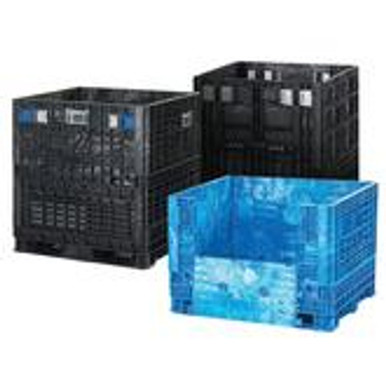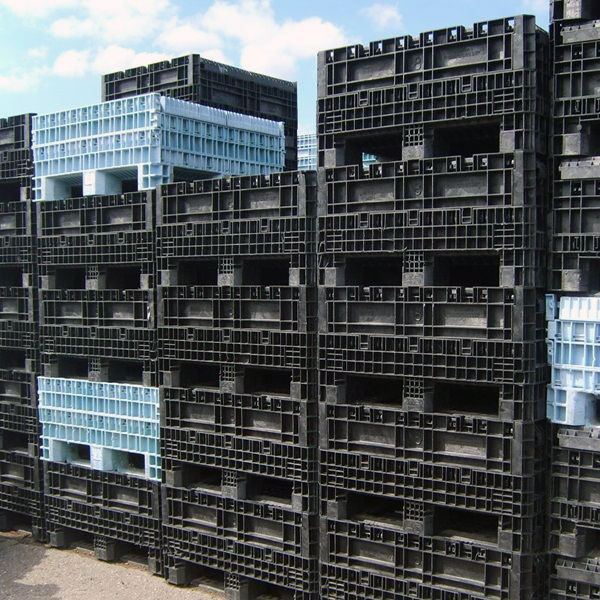The Ultimate Overview to Picking the Right Mass Containers for Your Service Demands
Picking the appropriate mass containers is crucial for any type of business that depends on efficient logistics. Various kinds of containers exist, each made for particular materials and applications. Variables such as size, product compatibility, and regulatory criteria play a considerable function in this decision-making procedure. Comprehending these components can result in improved functional efficiency. However, many companies forget essential aspects that can enhance their general efficiency and sustainability. What are these factors to consider?
Recognizing Various Kinds of Bulk Containers
Bulk containers function as crucial devices for businesses looking for efficient storage and transportation solutions. These containers can be found in different kinds, each developed to satisfy certain functional demands. One typical type is the intermediate bulk container (IBC), which is excellent for liquid and granulated materials, providing an equilibrium of capability and ability to move. One more popular option is the bulk bag, or FIBC, appropriate for completely dry, flowable items. These flexible containers are light-weight and can be easily delivered and kept. For heavier materials, inflexible mass containers are often utilized, supplying toughness and stability for risk-free handling. Additionally, there are customized containers customized for hazardous materials, guaranteeing conformity with safety and security policies. Understanding the unique attributes of these bulk container kinds enables organizations to make educated decisions that optimize logistics and decrease costs. By picking the best container, business can boost their operational efficiency and simplify their supply chain processes.
Key Product Considerations for Mass Containers
When picking bulk containers, it is vital to ponder the materials utilized in their building and construction. Aspects such as strength, chemical, and longevity compatibility play an important function in ensuring the containers satisfy certain functional needs. In addition, weight and portability worries can affect both performance and transportation logistics.
Material Longevity and Toughness
Resilience and toughness are critical consider choosing materials for bulk containers, as they directly affect the container's capability to endure numerous environmental problems and managing procedures. Materials such as high-density polyethylene (HDPE), polypropylene, and stainless steel are typically favored for their durable residential or commercial properties, providing resistance to temperature, impact, and abrasion variations. The selection of product likewise affects the general life expectancy of the container; stronger products typically lead to less regular replacements, resulting in cost financial savings in time. In addition, the weight of the material can influence delivery expenses and simplicity of handling. Companies should consider their details operational settings and the potential for wear and tear to assure peak sturdiness and stamina in their bulk container choice.
Chemical Compatibility Aspects
Understanding chemical compatibility is necessary for picking mass containers, as the materials used should withstand the details substances they will hold. Different factors influence compatibility, including the chemical nature of the components, temperature level, and period of storage space. For instance, harsh chemicals might need containers made from stainless steel or specialized plastics that stand up to deterioration. In addition, reactive compounds can produce warmth or gases, demanding aired vent or pressure-rated containers. The option of container product, whether polyethylene, metal, or polycarbonate, must line up with the chemical properties of the kept substances to avoid leaks or violations. Inevitably, a detailed examination of these compatibility variables assures secure handling and storage space, protecting both personnel and the environment while preserving product honesty.
Weight and Portability Issues
Picking mass containers involves not just assessing chemical compatibility but additionally taking into consideration weight and portability. Companies have to assess the simplicity of handling and transportation to enhance effectiveness. Light-weight materials like high-density polyethylene (HDPE) or light weight aluminum can assist in much easier movement and minimize delivery costs. On the other hand, heavier containers might give boosted durability yet can prevent mobility, specifically in environments requiring frequent relocation. In addition, the layout of the container ought to permit for hassle-free training and piling, making sure ergonomic safety for workers. Firms must likewise think about the infrastructure offered for transportation; as an example, containers compatible with forklifts or pallet jacks can simplify operations. Eventually, the best balance in between weight and transportability straight influences operational performance and expense efficiency.
Sizing Your Bulk Containers for Optimal Efficiency
When sizing bulk containers, companies must meticulously assess the dimensions called for to fit their specific items. Additionally, weight capability is a crucial element that influences efficiency and security throughout transportation and storage. Effective sizing not only maximizes space but additionally maximizes functional process.
Establishing Container Dimensions
Selecting the ideal measurements for mass containers is essential for making the most of website efficiency in storage space and transportation. Services should evaluate their details requirements, taking into consideration variables such as available area, the nature of the items being kept, and the approaches of transport utilized. Exact dimensions guarantee that containers fit ideally in cars and warehouses, lessening wasted room and decreasing handling time. Criterion dimensions can supply comfort, however custom-made measurements may be necessary for one-of-a-kind requirements or to fit specific items. Additionally, it is essential to review stacking abilities and ease of access, as these factors affect overall operational effectiveness. Eventually, the ideal dimensions bring about enhanced company and streamlined logistics, benefiting the total performance of business.
Weight Capability Considerations
Understanding weight capability is essential for services aiming to maximize their bulk container effectiveness. The weight ability of a container straight influences storage capabilities, transportation logistics, and overall operational costs. Picking containers with the appropriate weight limitations assures that companies can securely keep and carry their items without taking the chance of damages or compliance problems. Overwhelming containers can lead to structural failures, while underutilizing ability lead to squandered resources. When picking containers, it is essential for companies to assess their item weights and consider any kind of governing needs. In addition, factors such as the type of product, intended usage, and environmental problems ought to likewise influence weight capability choices. By examining these aspects, services can enhance effectiveness and assure a structured supply chain.
Governing Conformity and Safety And Security Standards

Regulatory compliance and safety standards play a vital role in the option of bulk containers for companies. Organizations must ensure that their containers meet various policies established by neighborhood, nationwide, and international authorities. These requirements frequently refer to material safety, architectural stability, and proper labeling, which aid stop mishaps and assure the risk-free transport of products.
In addition, adherence to industry-specific standards, such as those from the Fda (FDA) or the Occupational Safety And Security and Health And Wellness Administration (OSHA), is crucial for business dealing with unsafe products or foodstuff. Non-compliance can cause fines, lawful concerns, or damages to a business's online reputation.
Companies ought to likewise think about the container's compatibility with the products being stored or transferred to prevent contamination or chemical responses (used collapsible containers). To summarize, comprehending and implementing regulatory conformity and safety and security criteria is necessary for the reliable and liable usage of bulk containers
Sustainability Alternatives for Eco-Friendly Mass Containers

Firms are likewise exploring choices made from recycled products, which not just conserve resources but additionally sustain the recycling market. Innovations in layout permit for lighter containers that call for much less energy to transportation, further boosting sustainability. By incorporating these eco-friendly mass container choices, organizations can show their dedication to ecological stewardship while satisfying customer demand for sustainable practices. This change not only aids the earth yet can additionally boost brand name online reputation and customer commitment.
Cost-Effectiveness and Budgeting for Bulk Containers
While lots of companies concentrate on sustainability, cost-effectiveness continues to be a crucial element when picking mass containers. Organizations should evaluate the preliminary purchase rate, as well as lasting functional costs, to guarantee monetary feasibility. Elements such as sturdiness, maintenance, and reusability play a significant function in figuring out overall costs.
Investing in top quality containers might produce higher upfront prices however can lead to financial savings with minimized substitute rates and lowered waste. Additionally, businesses should consider transport expenses and storage space effectiveness, as these can impact the overall budget.

Often Asked Questions
How Do I Determine the Right Container for Hazardous Materials?
To establish the ideal container for dangerous products, one should evaluate compatibility with the substance, consider the container's material, look for regulative conformity, and evaluate capacity and safety and security features to assure correct handling and storage space.
Can Bulk Containers Be Customized for Certain Products?
Yes, bulk containers can be tailored for specific items. used collapsible containers. Various features, such as dimension, style, and material, can be customized to fulfill unique requirements, making certain perfect safety and efficiency for transporting and saving various goods
What Is the Typical Lifespan of Different Bulk Container Kind?
The average life-span of mass container types varies; plastic containers last 5-10 years, steel containers 10-20 years, and wood containers generally last 3-7 years, relying on usage, upkeep, and ecological problems.
How Should I Tidy and Maintain Mass Containers?
To clean up and preserve bulk containers, one need to on a regular basis evaluate for damages, get rid of residue, laundry with suitable detergents, rinse completely, and warranty proper drying prior to storage. Adhering to manufacturer guidelines boosts longevity and security throughout use.
Exist Rental Choices for Bulk Containers Available?
Yes, many companies supply rental alternatives for mass containers, giving flexibility for organizations. These services can accommodate numerous requirements, enabling firms to handle stock successfully without the commitment of purchasing containers outright.
Resilience and stamina are important elements in selecting materials for bulk containers, as they straight affect the container's capability to stand up to different environmental problems and managing procedures. Comprehending chemical compatibility is necessary for picking bulk containers, as the products made use of have to stand up to the certain materials they will certainly hold. Recognizing weight capacity is essential for organizations aiming to maximize their bulk container efficiency. Regulatory conformity and safety and security standards play a necessary function in the option of mass containers for organizations. While many services focus on sustainability, cost-effectiveness remains a vital factor when selecting mass containers.